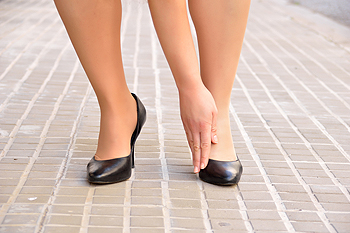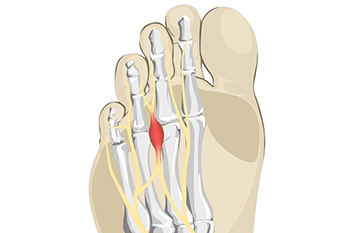Items filtered by date: September 2021
Can the Foods You Eat Affect Plantar Fasciitis?
Plantar Fasciitis is an inflammation of the band of tissue that connects your heel with your toes on the sole of your foot. Many people believe inflammation throughout the body can be reduced by making certain dietary adjustments—particularly by increasing the consumption of anti-inflammatory foods and decreasing consumption of inflammatory foods. Anti-inflammatory foods include green leafy vegetables, carrots, broccoli, strawberries, blueberries, tomatoes, legumes, nuts, lean meats, as well as tuna and salmon which are rich in omega-3 fatty acids. Inflammatory foods have high levels of sugar, including soft drinks, pastries and sweets, candy, processed foods, junk food, refined grains, as well as oils containing omega-6 fats (corn/soy/cottonseed oil), saturated fats and red meats. For more information on how to heal the pain and inflammation of plantar fasciitis, schedule an appointment with a podiatrist.
Plantar fasciitis is a common foot condition that is often caused by a strain injury. If you are experiencing heel pain or symptoms of plantar fasciitis, contact Cory Brown, DPM from Cory Brown, DPM. Our doctor can provide the care you need to keep you pain-free and on your feet.
What Is Plantar Fasciitis?
Plantar fasciitis is one of the most common causes of heel pain. The plantar fascia is a ligament that connects your heel to the front of your foot. When this ligament becomes inflamed, plantar fasciitis is the result. If you have plantar fasciitis you will have a stabbing pain that usually occurs with your first steps in the morning. As the day progresses and you walk around more, this pain will start to disappear, but it will return after long periods of standing or sitting.
What Causes Plantar Fasciitis?
- Excessive running
- Having high arches in your feet
- Other foot issues such as flat feet
- Pregnancy (due to the sudden weight gain)
- Being on your feet very often
There are some risk factors that may make you more likely to develop plantar fasciitis compared to others. The condition most commonly affects adults between the ages of 40 and 60. It also tends to affect people who are obese because the extra pounds result in extra stress being placed on the plantar fascia.
Prevention
- Take good care of your feet – Wear shoes that have good arch support and heel cushioning.
- Maintain a healthy weight
- If you are a runner, alternate running with other sports that won’t cause heel pain
There are a variety of treatment options available for plantar fasciitis along with the pain that accompanies it. Additionally, physical therapy is a very important component in the treatment process. It is important that you meet with your podiatrist to determine which treatment option is best for you.
If you have any questions, please feel free to contact our office located in Lewiston, ID . We offer the newest diagnostic and treatment technologies for all your foot care needs.
What to Avoid When It Comes to High Heels
High heeled shoes may be fashionable, but they are not your best footwear option when it comes to maintaining the proper health of your feet. Wearing high heels, particularly shoes that are tight-fitting, narrow, or have excessively high heels, can damage your feet. Frequent high heel wearing can lead to bunions, hammertoes, pump bump, corns, calluses, neuromas, ankle sprains, and even back pain. If you would still like to wear high heels, reduce the risk of potential problems by opting for shoes that do not have pointed or narrow toe boxes, or a heel taller than two inches. If you start to feel foot pain while wearing these shoes, it is suggested that you change into something more comfortable and properly fitting as soon as possible. For more information about the effects of high heels on the feet, please consult with a podiatrist.
High heels have a history of causing foot and ankle problems. If you have any concerns about your feet or ankles, contact Cory Brown, DPM from Cory Brown, DPM. Our doctor can provide the care you need to keep you pain-free and on your feet.
Effects of High Heels on the Feet
High heels are popular shoes among women because of their many styles and societal appeal. Despite this, high heels can still cause many health problems if worn too frequently.
Which Parts of My Body Will Be Affected by High Heels?
- Ankle Joints
- Achilles Tendon – May shorten and stiffen with prolonged wear
- Balls of the Feet
- Knees – Heels cause the knees to bend constantly, creating stress on them
- Back – They decrease the spine’s ability to absorb shock, which may lead to back pain. The vertebrae of the lower back may compress.
What Kinds of Foot Problems Can Develop from Wearing High Heels?
- Corns
- Calluses
- Hammertoe
- Bunions
- Morton’s Neuroma
- Plantar Fasciitis
How Can I Still Wear High Heels and Maintain Foot Health?
If you want to wear high heeled shoes, make sure that you are not wearing them every day, as this will help prevent long term physical problems. Try wearing thicker heels as opposed to stilettos to distribute weight more evenly across the feet. Always make sure you are wearing the proper shoes for the right occasion, such as sneakers for exercising. If you walk to work, try carrying your heels with you and changing into them once you arrive at work. Adding inserts to your heels can help cushion your feet and absorb shock. Full foot inserts or metatarsal pads are available.
If you have any questions please feel free to contact our office located in Lewiston, ID . We offer the newest diagnostic and treatment technologies for all your foot and ankle needs.
Morton’s Neuroma and the Invisible Pebble
Morton’s neuroma is a condition where a nerve located between the toes becomes damaged and swollen. This usually occurs due to injuries from playing sports or wearing ill-fitting shoes. Morton’s neuromas are most common among women, people between the ages of 40 and 60, and those who have foot deformities like bunions and hammertoes. Common symptoms include sharp, stabbing, shooting, or burning pain in the ball of the foot, and tingling and numbness. The hallmark symptom of this condition, however, is the strange sensation that you are walking on a pebble in your shoe, even though there is no pebble there. If you are experiencing the symptoms of Morton’s neuroma, consult with a podiatrist, who can find the right treatment for you.
Morton’s neuroma is a very uncomfortable condition to live with. If you think you have Morton’s neuroma, contact Cory Brown, DPM of Cory Brown, DPM. Our doctor will attend to all of your foot care needs and answer any of your related questions.
Morton’s Neuroma
Morton's neuroma is a painful foot condition that commonly affects the areas between the second and third or third and fourth toe, although other areas of the foot are also susceptible. Morton’s neuroma is caused by an inflamed nerve in the foot that is being squeezed and aggravated by surrounding bones.
What Increases the Chances of Having Morton’s Neuroma?
- Ill-fitting high heels or shoes that add pressure to the toe or foot
- Jogging, running or any sport that involves constant impact to the foot
- Flat feet, bunions, and any other foot deformities
Morton’s neuroma is a very treatable condition. Orthotics and shoe inserts can often be used to alleviate the pain on the forefront of the feet. In more severe cases, corticosteroids can also be prescribed. In order to figure out the best treatment for your neuroma, it’s recommended to seek the care of a podiatrist who can diagnose your condition and provide different treatment options.
If you have any questions, please feel free to contact our office located in Lewiston, ID . We offer the newest diagnostic and treatment technologies for all your foot care needs.
What Can Cause an Achilles Tendon Injury?
 The flexibility and strength of the Achilles tendon is a necessary component in completing running and jumping activities. It is located in the back of the leg and connects the calf muscles to the heel. Many patients can experience an Achilles tendon injury, and this can happen as a result of improper warming up and cooling down after increasing the intensity of a new sport. Additionally, this type of injury may occur if there are existing heel spurs, exercising on an uneven surface, or from wearing shoes that do not fit correctly. Some of the symptoms that are associated with an Achilles tendon injury can consist of difficulty in flexing and pointing the affected foot, and pain that gradually worsens as the day progresses. If you think you have incurred an Achilles tendon injury, please seek the counsel of a podiatrist who can guide you toward the correct treatment techniques.
The flexibility and strength of the Achilles tendon is a necessary component in completing running and jumping activities. It is located in the back of the leg and connects the calf muscles to the heel. Many patients can experience an Achilles tendon injury, and this can happen as a result of improper warming up and cooling down after increasing the intensity of a new sport. Additionally, this type of injury may occur if there are existing heel spurs, exercising on an uneven surface, or from wearing shoes that do not fit correctly. Some of the symptoms that are associated with an Achilles tendon injury can consist of difficulty in flexing and pointing the affected foot, and pain that gradually worsens as the day progresses. If you think you have incurred an Achilles tendon injury, please seek the counsel of a podiatrist who can guide you toward the correct treatment techniques.
Achilles tendon injuries need immediate attention to avoid future complications. If you have any concerns, contact Cory Brown, DPM of Cory Brown, DPM. Our doctor can provide the care you need to keep you pain-free and on your feet.
What Is the Achilles Tendon?
The Achilles tendon is a tendon that connects the lower leg muscles and calf to the heel of the foot. It is the strongest tendon in the human body and is essential for making movement possible. Because this tendon is such an integral part of the body, any injuries to it can create immense difficulties and should immediately be presented to a doctor.
What Are the Symptoms of an Achilles Tendon Injury?
There are various types of injuries that can affect the Achilles tendon. The two most common injuries are Achilles tendinitis and ruptures of the tendon.
Achilles Tendinitis Symptoms
- Inflammation
- Dull to severe pain
- Increased blood flow to the tendon
- Thickening of the tendon
Rupture Symptoms
- Extreme pain and swelling in the foot
- Total immobility
Treatment and Prevention
Achilles tendon injuries are diagnosed by a thorough physical evaluation, which can include an MRI. Treatment involves rest, physical therapy, and in some cases, surgery. However, various preventative measures can be taken to avoid these injuries, such as:
- Thorough stretching of the tendon before and after exercise
- Strengthening exercises like calf raises, squats, leg curls, leg extensions, leg raises, lunges, and leg presses
If you have any questions please feel free to contact our office located in Lewiston, ID . We offer the newest diagnostic tools and technology to treat your foot and ankle needs.




